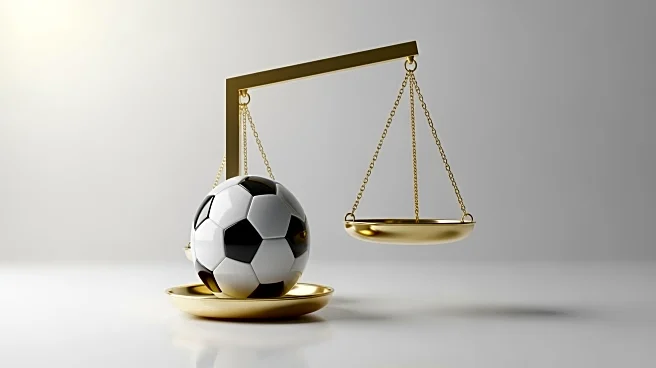What's Happening?
LaLiga players have initiated protests against the league's decision to hold a regular-season game in Miami. The protest began during a match between Real Oviedo and Espanyol, where players paused for
15 seconds to express their opposition. The protest was organized by the Spanish soccer players' union, which criticized the lack of transparency and dialogue from LaLiga regarding the decision. The union announced that protests would occur in games from Friday through Monday. LaLiga plans to hold the Barcelona-Villarreal game in Miami on December 20, a move defended by LaLiga president Javier Tebas as a strategy to boost revenues and increase the value of television rights. However, players and coaches, including Barcelona's Hansi Flick, have expressed dissatisfaction with the added travel and packed schedule.
Why It's Important?
The decision to hold a LaLiga match in Miami has significant implications for the league's international strategy and its relationship with players. By staging games abroad, LaLiga aims to increase its global presence and compete with the English Premier League's television rights. However, the protests highlight player concerns over increased travel demands and the lack of consultation in decision-making processes. This situation underscores the tension between commercial interests and player welfare, potentially affecting future negotiations between the league and players' union. The outcome of these protests could influence how international matches are scheduled and managed in the future.
What's Next?
LaLiga plans to make international matches an annual event, suggesting ongoing discussions and potential conflicts with players and unions. The league has chartered planes to transport fans to Miami, indicating a commitment to the event despite opposition. The players' union may continue to advocate for more transparency and dialogue, possibly leading to negotiations or adjustments in how such decisions are made. Stakeholders, including clubs and fans, will likely monitor the situation closely, as it could set precedents for international sports events and player involvement in decision-making.
Beyond the Headlines
The protests against the Miami match raise broader questions about the commercialization of sports and the balance between expanding market reach and maintaining player welfare. Ethical considerations regarding player rights and the impact of extensive travel on athletes' health are central to this debate. The situation may prompt discussions on the cultural implications of exporting domestic leagues and the potential dilution of local fan engagement. Long-term, this could influence how sports leagues approach globalization and the integration of player voices in strategic decisions.









